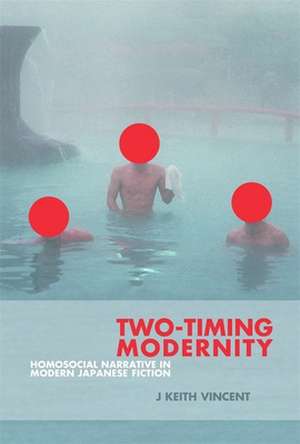Two–Timing Modernity – Homosocial Narrative in Modern Japanese Fiction: Harvard East Asian Monographs
Autor J. Keith Vincenten Limba Engleză Hardback – 3 dec 2012
Two-Timing Modernity integrates queer, feminist, and narratological approaches to show how key works by Japanese male authors--Mori Ōgai, Natsume Sōseki, Hamao Shirō, and Mishima Yukio--encompassed both a straight future and a queer past by employing new narrative techniques to stage tensions between two forms of temporality: the forward-looking time of modernization and normative development, and the "perverse" time of nostalgia, recursion, and repetition.
Din seria Harvard East Asian Monographs
-
 Preț: 379.33 lei
Preț: 379.33 lei -
 Preț: 223.05 lei
Preț: 223.05 lei -
 Preț: 303.56 lei
Preț: 303.56 lei -
 Preț: 230.64 lei
Preț: 230.64 lei -
 Preț: 202.85 lei
Preț: 202.85 lei -
 Preț: 262.56 lei
Preț: 262.56 lei -
 Preț: 367.33 lei
Preț: 367.33 lei -
 Preț: 239.80 lei
Preț: 239.80 lei -
 Preț: 283.30 lei
Preț: 283.30 lei - 13%
 Preț: 410.81 lei
Preț: 410.81 lei -
 Preț: 154.09 lei
Preț: 154.09 lei -
 Preț: 329.12 lei
Preț: 329.12 lei - 13%
 Preț: 342.72 lei
Preț: 342.72 lei -
 Preț: 267.21 lei
Preț: 267.21 lei -
 Preț: 186.22 lei
Preț: 186.22 lei -
 Preț: 146.80 lei
Preț: 146.80 lei - 19%
 Preț: 357.55 lei
Preț: 357.55 lei -
 Preț: 328.44 lei
Preț: 328.44 lei -
 Preț: 401.74 lei
Preț: 401.74 lei -
 Preț: 373.10 lei
Preț: 373.10 lei -
 Preț: 329.12 lei
Preț: 329.12 lei -
 Preț: 313.89 lei
Preț: 313.89 lei -
 Preț: 376.57 lei
Preț: 376.57 lei - 13%
 Preț: 362.75 lei
Preț: 362.75 lei -
 Preț: 359.64 lei
Preț: 359.64 lei -
 Preț: 373.98 lei
Preț: 373.98 lei -
 Preț: 343.65 lei
Preț: 343.65 lei - 13%
 Preț: 368.38 lei
Preț: 368.38 lei -
 Preț: 225.79 lei
Preț: 225.79 lei - 13%
 Preț: 369.51 lei
Preț: 369.51 lei -
 Preț: 304.91 lei
Preț: 304.91 lei - 13%
 Preț: 343.77 lei
Preț: 343.77 lei - 13%
 Preț: 345.29 lei
Preț: 345.29 lei - 13%
 Preț: 343.17 lei
Preț: 343.17 lei -
 Preț: 208.57 lei
Preț: 208.57 lei -
 Preț: 200.84 lei
Preț: 200.84 lei -
 Preț: 425.15 lei
Preț: 425.15 lei -
 Preț: 236.04 lei
Preț: 236.04 lei -
 Preț: 210.12 lei
Preț: 210.12 lei -
 Preț: 285.21 lei
Preț: 285.21 lei -
 Preț: 265.20 lei
Preț: 265.20 lei -
 Preț: 343.43 lei
Preț: 343.43 lei -
 Preț: 254.16 lei
Preț: 254.16 lei -
 Preț: 150.60 lei
Preț: 150.60 lei -
 Preț: 373.36 lei
Preț: 373.36 lei - 13%
 Preț: 387.47 lei
Preț: 387.47 lei -
 Preț: 194.54 lei
Preț: 194.54 lei - 27%
 Preț: 187.08 lei
Preț: 187.08 lei
Preț: 210.47 lei
Preț vechi: 280.94 lei
-25% Nou
Puncte Express: 316
Preț estimativ în valută:
40.29€ • 43.77$ • 33.86£
40.29€ • 43.77$ • 33.86£
Carte indisponibilă temporar
Doresc să fiu notificat când acest titlu va fi disponibil:
Se trimite...
Preluare comenzi: 021 569.72.76
Specificații
ISBN-13: 9780674067127
ISBN-10: 0674067126
Pagini: 300
Dimensiuni: 159 x 238 x 23 mm
Greutate: 0.5 kg
Editura: Harvard University Press
Seria Harvard East Asian Monographs
ISBN-10: 0674067126
Pagini: 300
Dimensiuni: 159 x 238 x 23 mm
Greutate: 0.5 kg
Editura: Harvard University Press
Seria Harvard East Asian Monographs
Descriere
Two-Timing Modernity integrates queer, feminist, and narratological approaches to show how key works by Japanese male authors in the early twentieth century encompassed both a straight future and a queer past by staging tensions between Japan's newly heteronormative culture and the recent memory of a male homosocial past now read as perverse.
